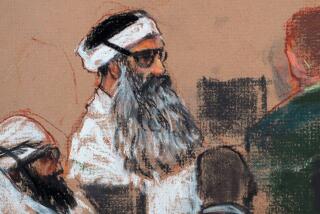American Values on Trial
- Share via
The Bush administration’s first plans for the trials of captured Taliban and Al Qaeda fighters threatened to make the U.S. justice system a casualty of the war on terrorism. Even when memories of Sept. 11 were rawest, the idea of holding secret military proceedings, denying defendants a choice of lawyers and making the president the sole court of appeal struck many as un-American.
A much-needed review by outside experts prompted the Defense Department Thursday to change some rules and moved the adjudication of the cases closer to this nation’s ideals, including the rule of law.
Defense Secretary Donald H. Rumsfeld now says trials will be public, not secret, unless secrecy is necessary to protect classified information or safeguard those involved. Panels will consist of three to seven military judges. Two-thirds agreement will be sufficient to convict of lesser crimes, but seven judges will need to agree to convict in death penalty cases.
In addition, defendants will be presumed innocent, will not be forced to testify, will not be tried twice for the same crime and must be proved guilty beyond a reasonable doubt. The government will provide military lawyers for the accused, who will also be allowed to hire civilian attorneys.
None of this is to say that the tribunals will be the same as a trial in Los Angeles Superior Court. Hearsay evidence, for instance, would not be excluded. But Rumsfeld has raised the possibility of further modification of rules. One such change should be allowing appeals to federal courts, not limiting them to a military panel (which could consider appeals under the changed rules) and ultimately the president. This need not mean a lengthy, complex process for most crimes. A special civilian panel could be established to handle the reviews with dispatch. Death penalty appeals would deserve additional time and scrutiny. Federal court appeals would end the executive branch’s stranglehold on the cases and give the whole process more credibility.
The terrorism defendants best know at this point will not be subject to military panels. Federal grand juries have brought charges against Richard C. Reid, who allegedly tried to blow up a Paris-to-Miami flight with a shoe bomb, Zacarias Moussaoui, accused of conspiring in the Sept. 11 attacks, and John Walker Lindh, the American who fought in the Taliban. They will be tried in civilian courts.
Rumsfeld insisted Thursday that so far there are no candidates for trial among the Taliban and Al Qaeda fighters held at Guantanamo Bay. It is possible that the military commissions will never be used, that the prisoners are so low-level they will eventually be sent back to their home countries. At some point the government must either bring charges or release the detainees. The assault on this country cannot be allowed to erode its bedrock values.
More to Read
Sign up for Essential California
The most important California stories and recommendations in your inbox every morning.
You may occasionally receive promotional content from the Los Angeles Times.













